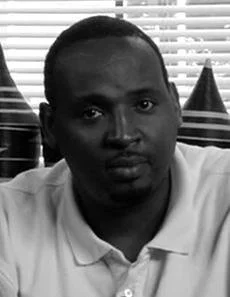Photo from the collection of: The USC Shoah Foundation — The Institute for Visual History and Education’s Visual History Archive®
Kizito Kalima
Born: June 3, 1979, Nyanza, Rwanda
Kizito Kalima was a basketball-loving 15-year-old in the spring of 1994. Then, in a sign of the terror to come, his father was killed in March. He had been an important Tutsi in their community.
The family was still mourning on April 6 when the genocide began. Hutu militia and thugs began by burning down houses in the town and killing Tutsi. Kizito and some of his family fled. They were sheltered by a nearby Hutu friend. But when word got out, the friend was in danger too. They fled again. They were soon caught in a massacre. Tutsi were shot, clubbed or hacked to death. Kizito was struck in the head by a machete. The blood from the wound made him look badly injured. He lay among dead bodies until the killers left.
Kizito was captured several times over the next weeks and each time he managed to escape—but not before watching uncles forced to drink poison, or coming upon the dying bodies of aunts. He had to watch helplessly as his mother was taken in the trunk of a car to a place where she would be killed.
Finally, he and two cousins escaped from a warehouse where they had been jailed. ey hid in the center of a deep swamp for almost three months, until they were rescued by the RFP, the rebel army. Life after the genocide, was very hard. His parents were dead. His surviving sisters and brothers were scattered, some in other countries. He was desperately poor.
Basketball saved him. He played it in a refugee camp. His skills helped him get into a school in Uganda. There he was noticed by a local basketball club coach, who helped him go to high school and college in the US. He now lives in the U.S. with his American wife and two adopted Rwandan teenage girls. He speaks about his experiences to students and others, hoping his words may prevent any other genocides.
Click here for background information on the genocide against the Tutsi in Rwanda.


